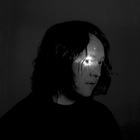
Antony & the Johnsons
Manchester Opera House
4th July 2009
The foyer of Manchester's elderly and ornate Opera House is awash with a sense of polite anticipation. Its audience for this evening's performance is as eclectic a gathering as the event they have arrived for. If you didn't know, it would be hard to guess what unites, albeit briefly, this assemblage of souls. The occasional towering transvestite indicates an alternative twist, but there is no particular age group, and no apparent niche prevails.
What has brought them here for this second, and final night?
The posters reveal a monochrome shot of an androgynous face, whose right eye is accentuated by a starburst. The visage is Antony Hegarty's, an English-born singer/songwriter now resident in New York.
This is the most basic of facts, for he is that curious amalgam, a leftfield eccentric with mass appeal. Some people are born for a setting that befits their talent, but many never bask in such surroundings.
A few years ago Antony and the Johnsons played the tiny oven that is Manchester's Academy 3. It was a breathtaking performance, not because of spectacle and scale, but from the sheer physical presence that his voice commands. If a pin had been dropped that night you would have heard it, amongst the audience clutching their brimming plastic pints of beer, who usually chatter through the quietest moments of songs. They were reverential to the point of subservience.
The idea of this maverick talent filling a more opulent venue, and one that befitted his extraordinary gifts, seemed unlikely, but terribly unfair, but then the unlikely occurred.
He won the Mercury Music Prize in 2005, and this alerted the wider world to the best ever secret they'd be permitted to share.
Tonight as the lights turn a haunting kind of blue, that voice fills the gilt Rococo and brocade cavern of Manchester's Opera House. A bubbling warmth and sadness catches the audience; there is a divine, disembodied melancholia afoot. What resembles the remnants of an ice crystal is projected onto the stage, and the voice continues to soar with sublime subtlety and sadness.
Spectacle distracts the eye, and then, many minutes in, the source of this sound, awash with strings, emerges from out of the light, robed in white like a prophet, lunatic, or refugee. In what can only be described as a cross between a shroud and a surgical gown, the diva of the evening unleashes a soul-stroking sound.
The set continues to evolve: he is now emoting from within a green-hued palace of ice. Rarely has a talent been better served by a setting of such contextual sympathy. Antony is a talent from the margins, a freak from the fringe. A large man, tall and wide, who sings like an angel, his influences are revealed by his choice of cover star. The late, alluring Candy Darling, the Andy Warhol Superstar who died tragically young. His subject for a song, the comedy gross-fest that was Divine, the fat female impersonator who gained fame from eating dog crap on film. The wayward soul that was the tragically prematurely dead singer Donny Hathaway. Antony's icons are tarnished outsiders, brazen but beautiful, maligned and reviled, dysfunctional functionaries. His latest album, The Crying Light, reveals an elderly Japanese actor in full drag, and all his rickety grandeur.
As the lights turn red, he is supplanted into a briefly flickering suggestion of hell. Tonight he is not just a singer, the evening is a cross between a concert performance and a Soho art installation. At times the brevity is unbearably moving, and the occasional uneasy twisting of his hands can be unsettling, betraying an artist of grace, vulnerability, and underlying issues. The majesty of the lights, the lack of physical punctuation or distraction occasionally reveals the limits of intrinsic beauty. But as events teeter on the verge of implosion, he then pulls it back from the brink with a soaring melody, and a refined inflection of emotion.
He is an amalgam of ghosts -- Maria Callas meets Klaus Nomi. The only other performer who can harness a seemingly un-commercial talent into a concert hall setting is the thrilling but provocative Diamanda Galas, the extreme female counterpoint to Antony's quiet androgyny. That "I Fell in Love With a Dead Boy" has a mainstream appeal, or that his analogies of starfish and of being a beautiful woman, resonate with people beyond the confines of the experiences which bore them, is a fitting testament to the strength and artistry of Antony.
When the backdrop rises to reveal the Manchester Camerata, the source of his bed of strings, the illusion and artifice dissolves into something more spontaneous. A spell breaks and Antony becomes more of a flesh-and-blood person than the distant, disembodied entity of the previous hour. His playfulness is revealed and he seems more at home, relaxed and spontaneous, even sparing a thought for the loss of Mrs. Slocombe, the recently departed U.K. actress Mollie Sugden, dead in the same week as Michael Jackson.
Manchester International Festival is to be applauded for allowing such a unique moment to blossom. Mostly, such events merely re-package something you could have witnessed elsewhere. This was a unique evening, memorable and haunting, not least because of Paul Normandale's stupendously subtle lighting, a perfect visual accompaniment to the rarefied proceedings. Antony bowed out to a standing ovation, and the audience left with a profound sense of connection to a world that was not as theirs.
As the auditorium dwindled, a bearded man with an opera to sell, another unique event from this year's proceedings, Rufus Wainwright could be glimpsed slipping through the stage door. A touchingly perfect vignette to close a fabulous evening.
